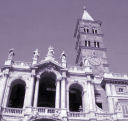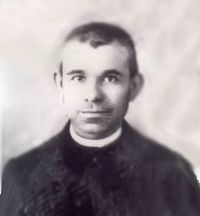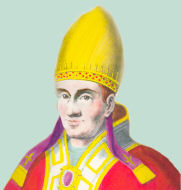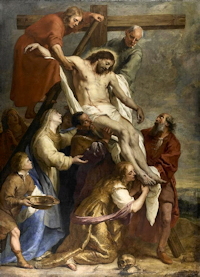Lent: March 12th
Wednesday of the First Week of Lent; Ember Wednesday
Other Commemorations: St. Luigi Orione, Priest (RM); St. Innocent I, Pope (RM)
» Enjoy our Liturgical Seasons series of e-books!
The Roman Martyrology commemorates St. Luigi Giovanni Orione, F.D.P. (1872-1940) (also known as Aloysius). He was an Italian priest who was active in answering the social needs of his nation as it faced the social upheavals of the late 19th century. To this end, he founded a religious institute of men. St. Luigi was canonized by St. John Paul II on May 16, 2004.
St. Innocent I (d. 417), 40th pope of the early Church is also commemorated. Pope Innocent was a friend of Saint John Chrysostom. He reigned from 402-417. So much of his work was battling various heresies and schisms: Novatianism, Montanism, Arianism, Pelagianism and Priscillianism. He was pope during the sack of Rome by Alaric the Goth in 410.
Today is Ember Wednesday, the beginning of the Spring or Lent Embertide. There are two principal objects for the Ember Days of this period of the year: the first is to offer to God the season of Spring, and, by fasting and prayer, to draw down His blessing upon it; the second is to ask Him to enrich with His choicest graces the priests and sacred ministers who are to receive their Ordination on Saturday. See also Contemporary Observation of Ember Days and Lenten Ember Days for more information.
Meditation for Wednesday of the First Week of Lent
The people of Nineveh are also our model for Lent. They did penance at the preaching of Jonah the prophet and obtained divine mercy and pardon. Christ is preaching penance to use today through his Church. Should we not also put on the sackcloth of self-denial and take on the fast to remedy our self-indulgence that we also may obtain forgiveness for ourselves? Nor should we forget to pray for a world which is drowning in the sin and vice of its own creation.
Before we arrive at the joy and glory of Easter we have first to go through forty days of Lenten journey. This period of preparation is designed by God. It is not merely a time of self-denial, of death to self, and of carrying the cross; it is a time of recovery of our real self, of a more real life, and of sharing in Christ's glory. God intends that we should accustom ourselves to live the Paschal rhythm of "death and life" to reclaim one's real self and to become ready to share in Christ's glory.
—St. Andrew Bible Missal
Lent Ember Days or Lent Embertide, Ember Wednesday of Lent
The Church has traditionally designated Wednesday, Friday and Saturday of the First Week in Lent during which to consecrate the season of spring to God and to obtain graces, through prayer, fasting and the offering of the holy Sacrifice. These days, however, unlike those of the other seasons, do not refer to the fruits of the earth, but are rather expiatory in character.
The Lenten Ember days are the most recent of the four sets of Ember Days and do not have the same importance as the other three, since the whole of Lent is devoted to spiritual renewal. Doubtlessly the three days, Wednesday, Friday and Saturday, formed part of the Lenten liturgy from its very beginning. Wednesday, devoted to our Lady, is a day of reflection and spiritual orientation; Friday emphasizes conversion and penance; Saturday, a preview of Easter, marked the renewal of our baptismal covenant.
On all four Ember Wednesdays the stational service was observed in the largest church of our Lady in Rome, St. Mary Major. This basilica, which dates from the fourth century, was rebuilt by Pope Sixtus III (431-440), and dedicated to our Blessed Mother as a result of the Council of Ephesus' definition of the divine motherhood of the Virgin Mary.
It is probable that in the second half of the fourth century the Ember day observance was rearranged and the three great churches (St. Mary Major, Holy Apostles, St. Peter) were selected as stations.
Today, then, we pilgrimage to the largest and most venerable shrine of Our Lady in the world and honor the Mother of God as our patron. The humble guise in which we meet her in the Gospel serves as a model for Lenten humility. Nevertheless, we are promised a participation in her dignity, i.e., we are destined to become "mothers and brothers to Jesus," if we do "the will of His Father." Thus Mary is our companion during Lent. Devoutly and suppliantly we enter the stational church, reminding God of His never failing mercy and begging for liberation from oppression. The kingdom of God never lacks enemies.
"The men of Nineveh [the pagans] shall rise in judgment with this generation [the chosen people of Israel] and shall condemn it; because they did penance at the preaching of Jonah; and behold a greater than Jonah here. The queen of the South [of Saba] shall rise in judgement with this generation and shall condemn it; because she came from the ends of the earth to hear the wisdom of Solomon; and behold a great then Solomon here." The chosen people would have nothing to do with their Savior when He came to them. They rejected Him, and therefore they themselves were rejected. We who are of the Gentiles have been chosen in their place. Mary and our Holy Mother the Church lead us to Him. In baptism we were made His brothers and sisters and were joined to Him in a union of prayer, in a union of life and spirit. From that moment we are bound to do the will of the Father.
We can prove unfaithful to our vocation, lose our faith, and fall away. For this reason the Church presses upon us the urgency of self-examination, penance, and meditation during the holy season of Lent, for the "men of Nineveh did penance at the preaching of Jonah" and thus found favor with God.
Our hearts are filled with gratitude for the great grace that has been given to us in baptism. We should renew our desire and our resolution to accomplish the will of the Father. "I will meditate on Thy commandments which I have loved exceedingly; and I will lift up my hands to Thy commandments which I have loved."
—adapted from Dom Rembert Bularzik, O.S.B, Orate Fratres, Pius Parsch, OSB, The Church's Year of Grace and Benedict Baur, The Light of the World

Wednesday of the First Week of Lent (Ember Wednesday)
Station with Santa Maria Maggiore (St. Mary Major):
The spring Ember Week consecrated the new season to God and by prayer and fasting sought to obtain abundant graces for those who on Saturday were to receive Holy Orders. The Station was fittingly held in the church, which witnessed the first scrutinies for the coming ordinations, and which was dedicated to the mother of the great High Priest.
For more on Santa Maria Maggiore, see:
- Churches of Rome
- The Station Churches of Rome
- Rome Art Lover
- Roman Churches
- PNAC
- Aleteia
- Station Church
- The Catholic Traveler
For further information on the Station Churches, see The Stational Church.
St. Luigi Orione
 Luigi Orione was born in Pontecurone, diocese of Tortona, on 23 June 1872. At thirteen years of age he entered the Franciscan Friary of Voghera (Pavia), but he left after one year owing to poor health. From 1886 to 1889 he was a pupil of Saint John Bosco at the Valdocco Oratory (Youth Centre) in Turin.
Luigi Orione was born in Pontecurone, diocese of Tortona, on 23 June 1872. At thirteen years of age he entered the Franciscan Friary of Voghera (Pavia), but he left after one year owing to poor health. From 1886 to 1889 he was a pupil of Saint John Bosco at the Valdocco Oratory (Youth Centre) in Turin.
On 16 October 1889, he joined the diocesan seminary of Tortona. As a young seminarian he devoted himself to the care of others by becoming a member of both the San Marziano Society for Mutual Help and the Society of Saint Vincent de Paul. On 3 July 1892 he opened the first Oratory in Tortona to provide for the Christian training of boys. The following year, on 15 October 1893, Luigi Orione, then a seminarian of twenty-one, started a boarding school for poor boys, in the Saint Bernardine estate.
On 13 April 1895, Luigi Orione was ordained priest and, on that occasion, the Bishop gave the clerical habit to six pupils of the boarding school. Within a brief span of time, Don Orione opened new houses at Mornico Losana (Pavia), Noto - in Sicily, Sanremo and Rome.
Around the young Founder there grew up seminarians and priests who made up the first core group of the Little Work of Divine Providence. In 1899, he founded the branch of the Hermits of Divine Providence. The Bishop of Tortona, Mgr Igino Bandi, by a Decree of 21 March 1903, issued the canonical approval of the Sons of Divine Providence (priests, lay brothers and hermits) - the male congregation of the Little Work of Divine Providence. It aims to "co-operate to bring the little ones, the poor and the people to the Church and to the Pope, by means of the works of charity," and professes a fourth vow of special "faithfulness to the Pope." In the first Constitutions of 1904, among the aims of the new Congregation, there appears that of working to "achieve the union of the separated Churches."
Inspired by a profound love for the Church and for the salvation of Souls, he was actively interested in the new problems of his time, such as the freedom and unity of the Church, the Roman question, modernism, socialism and the Christian evangelization of industrial workers.
He rushed to assist the victims of the earthquakes of Reggio and Messina (1908) and the Marsica region (1915). By appointment of Saint Pius X, he was made Vicar General of the diocese of Messina for three years.
On 29 June 1915, twenty years after the foundation of the Sons of Divine Providence, he added to the "single tree of many branches" the Congregation of the Little Missionary Sisters of Charity who are inspired by the same founding charism. Alongside them, he placed the Blind Sisters, Adorers of the Blessed Sacrament. Later, the Contemplative Sisters of Jesus Crucified were also founded.
For lay people he set up the associations of the "Ladies of Divine Providence," the "Former Pupils," and the "Friends." More recently, the Don Orione Secular Institute and the Don Orione Lay People's Movement have come into being.
Following the First World War (1914-1918), the number of schools, boarding houses, agricultural schools, charitable and welfare works increased. Among his most enterprising and original works, he set up the "Little Cottolengos," for the care of the suffering and abandoned, which were usually built in the outskirts of large cities to act as "new pulpits" from which to speak of Christ and of the Church - "true beacons of faith and of civilization."
Don Orione's missionary zeal, which had already manifested itself in 1913 when he sent his first religious to Brazil, expanded subsequently to Argentina and Uruguay (1921), Palestine (1921), Poland (1923), Rhodes (1925), the USA (1934), England (1935), Albania (1936). From 1921-1922 and from 1934-1937, he himself made two missionary journeys to Latin America: to Argentina, Brazil and Uruguay, going as far as Chile.
He enjoyed the personal respect of the Popes and the Holy See's Authorities, who entrusted him with confidential tasks of sorting out problems and healing wounds both inside the Church as well as in the relations with society. He was a preacher, a confessor and a tireless organizer of pilgrimages, missions, processions, live cribs and other popular manifestations and celebrations of the faith. He loved Our Lady deeply and fostered devotion to her by every means possible and, through the manual labor of his seminarians, built the shrines of Our Lady of Safe Keeping in Tortona and Our Lady of Caravaggio at Fumo. In the winter of 1940, with the intention of easing the heart and lung complaints that were troubling him, he went to the Sanremo house, even though, as he said, "it is not among the palm trees that I would like to die, but among the poor who are Jesus Christ." Only three days later, on 12 March 1940, surrounded by the love of his confreres, Don Orione died, while sighing "Jesus, Jesus! I am going."
His body was found to be intact at its first exhumation in 1965. It has been exposed to the veneration of the faithful in the shrine of Our Lady of Safe Keeping in Tortona ever since 26 October 1980 - the day in which Pope John Paul II inscribed Don Luigi Orione in the Book of the Blessed. He was canonized on 16 May 2004.
—© Libreria Editrice Vaticana
Highlights and Things to Do:
- Read more about St. Luigi Orione:
- Find out more about The Sons of Divine Providence, the order founded by St. Luigi, and their work, Orionecare. See also the Italian main site.
- St. Luigi's body was found intact when exhumed in 1965. His remains are now interred at the shrine of Our Lady of Safe Keeping, Tortona, Italy.
St. Innocent I
 Innocent was born in Albano, Italy. He lived during the time of Saints Jerome and Augustine. He became Pope, on December 22, 401. Jerome, writing to the virgin Demetrias, says of him: "Hold fast to the faith of holy Innocent, who is the son of Anastasius of blessed memory and his successor in the apostolic throne; receive no strange doctrine, however shrewd and prudent you may think yourself."
Innocent was born in Albano, Italy. He lived during the time of Saints Jerome and Augustine. He became Pope, on December 22, 401. Jerome, writing to the virgin Demetrias, says of him: "Hold fast to the faith of holy Innocent, who is the son of Anastasius of blessed memory and his successor in the apostolic throne; receive no strange doctrine, however shrewd and prudent you may think yourself."
During his pontificate, Innocent emphasized papal supremacy, praising the bishops of Africa for referring the decrees of their councils at Carthage and Milevis in 416 that condemned Pelagianism, to the pope for confirmation. This confirmation stirred St. Augustine to pen his famous remark: "Roma locuta, causa finita est" (Rome has spoken, the matter is ended).
Innocent was pope during the capture and sack of Rome by the Goths under Alaric in 410. He condemned the heresies of Pelagius and Celestinus, decreeing that children, even though born of a Christian mother, must be born again by water, in order that their second birth may cleanse away the stain they have contracted by the first. He also approved the observance of fasting on the Saturday in memory of the burial of Christ our Lord. He fought the unjust removal of Saint John Chrysostom and spoke strongly in favor of clerical celibacy. He sat fifteen years, one month, and ten days. Innocent died in Rome, March 12, 417 and was buried in the cemetery called ad Ursum Pileatum.
—Some material excerpted from The Liturgical Year, Abbot Gueranger O.S.B.
Symbols and Representation: Angel holding a crown.
Highlights and Things to Do:
- Read four letters of Correspondence between Innocent and Saint John Chrysostom.
- Read more about St. Innocent I:






